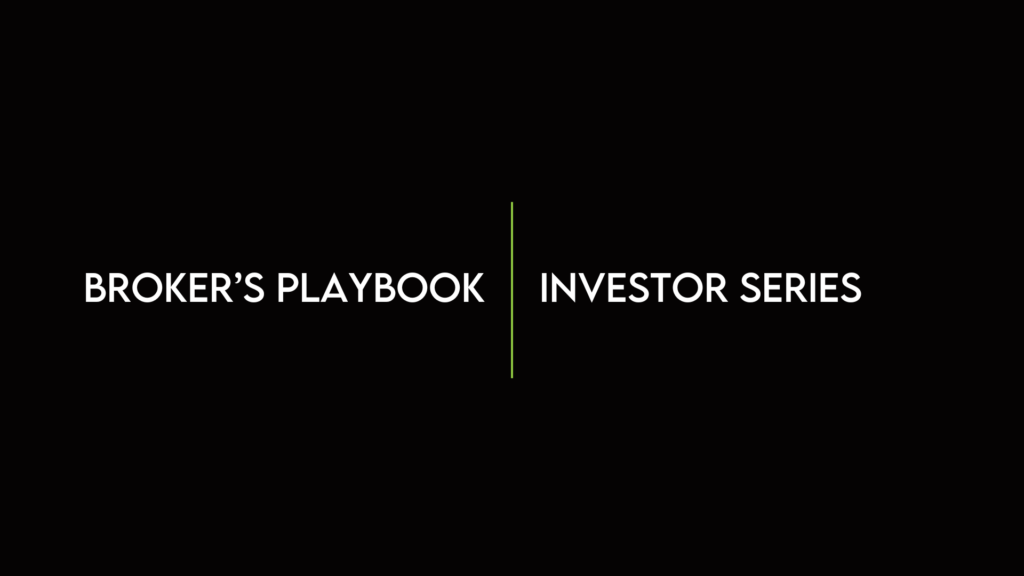Welcome to our newest episode of Broker’s Playbook! In this episode, we have the founder and CEO of Frank Mortgage – Don Scott. This new fintech mortgage platform is here to bring transparency and choice direct to each of our clients. Find out more about this revolutionary new way of doing business in the world of mortgages, and support the crucial change that this technology can bring! Tune into Broker’s Playbook now to hear from Mr. Don Scott about all things Frank Mortgage. Don’t forget to like and subscribe!
Simeon Papailias: Hello once again. To all my brothers and sisters in the business. This is Broker’s Playbook. With another fire episode coming up, I will be introducing to the Broker’s Playbook community. Mr. Don Scott, founder and CEO of Frank Mortgage. Frank Mortgage is a fintech mortgage platform newly launched to market, looking to do one thing and one thing only. Bring transparency and choice direct to each of our clients. There’s incredible ways to work with them. Bringing this type of technology to the market where it really democratizes that whole market segment. I’m excited for you to find out more and how this new fintech can bring change to our really archaic system and old way of doing business. Mr. Don Scott, welcome to Broker’s Playbook, my friend. I’m very excited to have this conversation today. Thank you.
Don Scott: Simeon. I appreciate the invitation to be here.
Simeon Papailias: Um, we set this up quickly after meeting for the first time a few weeks ago. We were introduced by a mutual friend. Um, and this mutual friend is actually somebody that has taken almost a mentorship role in my life, a very respected legend in the business, Bay Street background, and now the development business I’m referring to actually, Mr. Salapoutis, he’s the president or he is. Yeah, I think so. He’s the president of Gray Brook. Brook Securities. I’m actually referring to Mr. Chris Salapoutis, who is the president at Greybrook, and he has he thought it was good for us to meet because of some of the. Things that we’re doing and what your platform is doing. And once we met. Sure enough, there is a whole lot of opportunity for us to work together in bringing some serious and significant change in the way we do business. Uh, today I want to focus on what your platform is doing. I have lots of time to. To explain all the things that brokers playbook is doing. But today I want to make this about you and Frank, because I was excited by it. Uh, tell me a little bit about let’s start with you and your background, because I think the all of this has to do with how we got here to what Frank Mortgage is. Tell me a little bit about your beginnings and your path in life and in business. Sure.
Don Scott: I go back in the mortgage market over 30 years. I started in 1991 at First Line Trust, which was an innovator in the market at the time in both the broker space for origination, but also in securitization for funding. And that’s the path I took for most of my career. I followed the funding path. So I worked at CIBC and Deutsche Bank and Maple Bank, different financial institutions that funded mortgage lenders. So built a couple of businesses, one at Deutsche, one at Maple from scratch that funded a lot of the medium and smaller sized lenders in the marketplace, giving them access to capital markets, giving them access to warehouse lines, giving them access to, you know, funding that they couldn’t otherwise find. And so I’ve been very close with these lenders, loved their business, loved, loved the people. And when I left the last bank I was at wanted to stay involved and engaged in the mortgage market. Really, I have a love for the market and decided to flip around to the other side of the market. The consumer facing front end and the way to do that is using technology to try to find a way to alleviate a lot of the pain points that you see customers report that they have. When you see customer.
Simeon Papailias: Surveys and there is many.
Don Scott: Oh, many, yeah. And they’re common and they’ve been common for 30 years. And that’s one of the sort of things that sort of I don’t want to say frustrates me, but that I’ve noted all the time through my career is that there are these issues that constantly keep popping up on the origination side of the market, and I never really saw anybody really making a concerted effort to try to do something about it here and there. They make little changes, but it’s often difficult for customers to figure out what to do to get a mortgage. They find it. The market is opaque. It’s hard to get access to information when they report back through surveys like CMHC or HCA or whoever it is. They say it’s cumbersome, it’s confusing. They exit the process with a mortgage, but they’re not quite sure they got the best deal they could have got. And it just doesn’t need to be that way. And so now with the advent of fintech, you know, this online system that you can create for any kind of consumer, but for a mortgage consumer, you can present information to them in new ways and make it easier for them to find what they need to know, to understand what they’re getting into when they get into the mortgage process, as well as create a way to be just more open and transparent about what their options are. Because the market today, the traditional old process still exists in the fintech models. You know, there’s two basic models. One is we’re a traditional broker and we’ve got now got an online front end. So somebody can come on and apply online, but then they’re kicked into a traditional process with a mortgage broker, and that introduces the biases that exist in the marketplace. It’s not really anyone’s fault. I’m not saying brokers are doing anything wrong, but lenders pay. The brokers broker is supposed to represent the customer. So the truth.
Simeon Papailias: The truth of the matter is that and there’s a myriad of broker houses call it monster mortgage dominion lending. There’s a million different broker houses and everybody has their relationships ten, 50, 100 relationships. And although it’s more choice than walking into any of the big Seven. Because when you walk into the big green machine, you’re going to get the green rates. You walk into the red one, you get the red rates. So so working with the broker, you’re going to get 20, 30, 40 options. 50 options. But out of the 50, my understanding, 95% of those are going to end up wherever the compensation or the incentives drive the broker to make the decision.
Don Scott: Fortunately, that’s the case, and that’s one of those biases that is an unfortunate outcome. It’s not something that people sort of try to manipulate a customer. It’s just the incentives make it so that brokers sometimes will steer a transaction to an outcome that’s really great for them. And it may or may not be always the best outcome for the customer. And then you’ve got the other fintech model where they front themselves as a broker, but they actually own a lender. And their bias is to steer that customer to their own lender. So again, there’s a bias introduced there where they may not show you other offers because they want you to go to that lender that they own. So we think that there’s a way through a fintech model to create a completely agnostic process for a customer where they can go online, get access to the information they need to help them get up the curve and understand how much they can afford and what the process is like, and then see sort of almost like an Expedia type of output. When you’re looking for a hotel in Cancun, you can see all these options that are available to you without the broker sort of now having inserted themselves in that information flow with their bias that, well, maybe you should go to this lender because that’s my best relationship. That’s not how we operate. We don’t insert ourselves in that product selection except to the extent that we’re giving them advice on what they’re seeing. That’s right. So they can see that there’s maybe a small credit union that has a really terrific rate. But what are the product features? They can see that all those big lenders have maybe different rates and why are they different and what are the differences in the product features? So we advise them we’re still a broker. So we have licensed agents that help the customers through the process, but they get to see it and they can see what’s available. You’re peeling back.
Simeon Papailias: You’re peeling back the curtain and allowing them to make a choice or at least inquire about what the benefits, the pros and cons of any lender or any term sheet. Right. So they get the consumer does get access to professional advice from licensed brokers. So it’s not like a just I know human there is full service. Exactly. But the consumer gets to see the back of the house.
Don Scott: That’s right. It’s still a very big financial commitment and decision. And and most people want to talk to somebody who’s an expert in the field. So we provide that. Still. We provide the customer service level, but we don’t interfere in the delivery of information to them. And we, in a sense, reduce the influence of the broker, even though we’re still there helping, we’re reducing our influence in the decision and putting the power that we’ve now taken from the broker and giving it to the consumer a little more autonomy, a little more control over your own process and a little more visibility to what’s available to you. So you have the choice and the ability to make the decision without worrying about somebody else’s bias steering you wrong. So it’s a completely different model and we don’t see many of the fintechs embracing that idea. They still want to embrace one of those two. I described sort of the traditional broker model or the lender backing them model. And we’re we’re going to stay away from both of those biases and be purely agnostic and just customer first 100% of the time.
Simeon Papailias: That’s amazing. And the actual compensation to the broker working at both the mortgage broker and whoever else for sourcing is still paid for by the institution that’s going to do the deal. That’s right. So the consumer never has to pay for anything. It’s still compensated by the the institution that’s going to fund it.
Don Scott: That’s right. So our compensation model is the broker revenue from the lender in the prime space. That’s the model for every broker. Yes. In the B institutional space, not private, but the B and Alt space. A lot of the brokers charge fees for that. We don’t. So for a user that comes on to our system, that uses us to find an institutional lender, be it an a lender like one of the banks or a first national or a lender like McCann or a Home Trust, no fees paid to the broker. So we’re we’re fee neutral that way for the customer. We’re free to use and we take the fees from the lender and often. We’ll discount the fee to give that customer a better deal, because one of the things I think that’s nice about technology or that should be anybody that’s putting out a tech platform should be thinking about cost. And one of the efficiencies that can be driven from technology is the cost efficiency We can bring down the cost. There’s a lender proposition here to bring down the cost for our lender partners by reducing the overhead for them to review a file. If we properly digitally scrub it, deliver a complete file 100% of the time. So that’s an objective. But with the customer as well, because a lot of this is automated, we can bring the cost of the whole process down and deliver some savings to them with a lower rate by, you know, using our fees to some extent to buy down those rates. So there’s there’s not just efficiency and transparency benefits, but there can be rate and cost benefits for the customers as well.
Simeon Papailias: From a biz development side, one of the biggest values that I have received in my career and continue to receive from many of my mortgage partners, I have at least a half a dozen of people that I’ve worked with for a decade is the the fact that I can rely on their expert advice for my clients. Yes, that trust factor. Do you have a team of brokers that you would say are able to take the capacity on of? I have a book of business of 10,000 investors. I’m at a stage of my career at 17 years in where things are busy and things are good. Is your team of brokers able to hold the hand of my agents? For example, I have a team of agents. I have 55 agents on my team. If I were to introduce you as a service, how are you going to work with my brokers or with any of our any of the brokers in Canada, for that matter, that are watching right now to make sure that their clients are a priority, that they’re getting the guidance and support that they need, because that’s a huge component. It is a huge component Trust between broker and broker, mortgage broker, real estate broker, talking about the person that’s in our world needs expert help. The investor community specifically. I know that I put my clients through three, 4 or 5 deals every 3 to 4 years. The structures matter. Are you investor friendly or are you like, how does your team handle all that?
Don Scott: We are investor friendly and so, yeah, our agents can handle a lending primary residence, rental lending, private lending as well. And what we do with our partners is provide a sort of a new level of information and involvement in the mortgage process, if you will. So for a realtor in particular, we now have like a pilot dashboard that we’ve developed for for brokers, for brokers, so they can track their customers activity on our platform. So they can log in to a secure portal. They’ll only see their customers and they can see what stage of the process they’re at. And what’s the most recent thing that’s happened? You know, did they get the pre-approval letter? Did they get the commitment letter?
Simeon Papailias: Have they put on all their paperwork?
Don Scott: Yeah. That’s incredible. Are we waiting for a signature for somebody, for instance, so the realtor can stay involved as opposed to that old traditional way where you might send someone off to see someone at the bank or someone at a broker and the customer might disappear for a few days. In our ecosystem, you know you’re involved right away. We have the conversation with the customer. We put it in the notes, you log in, you see the customer, you see what the conversation was so you can track your customer’s mortgage journey in a much more proactive way and efficient through this. And efficient.
Simeon Papailias: Yeah. You don’t have to call a million people. What’s going on over here? What’s going on over there? You don’t have to wonder. Did they do the application? Of course they did the application because you can see in your dashboard or. Yes, they have. And follow up.
Don Scott: Yeah. And because we deal with the banks and we deal with the large monolines and we deal with the small monolines and the credit unions and the private lenders and the big lenders. The odds of finding a yes somewhere for your customer are very high as opposed to, say, sending them off to one of the big banks who say no a lot. So we deal with a wide variety of lenders and we have expertise in our agent base to handle the variety of products, rental, primary residence, mortgages, etcetera.
Simeon Papailias: That’s amazing. And thank you for clarifying that. I actually didn’t know that last component when I was asking the question. I’m glad I did because that’s huge.
Don Scott: I think so.
Simeon Papailias: Yeah, that’s huge. Actually. A good friend, Ruven, who was on the show a few months ago, did the same thing for the legal process. Yeah, I would love to see sometime in the future some kind of a collaboration where we tie the entire transaction, where we have that we’re building that for, for real estate in an agnostic way, meaning not brand preferred, etcetera, but client focused. Imagine being able to bring deeded for example, which is Ruben’s platform you have. That’s, that’s incredible. He’s incredible. Yeah, I love that guy. And he’s doing big things and he’s always done big things. He’s he’s a visionary guy. I would love to see that collaboration. Yeah, Yeah. We’re going to tag Ruben in this episode.
Don Scott: Yeah, because one of the things that sort of is behind our philosophy here is we don’t think people roll out of bed in the morning and say, I want to get a mortgage. They roll out of bed and say, I think it’s now it’s time for me to go see if I can buy a house. That’s what they’re after. They’re not after a mortgage. A mortgage is just a necessary piece of the process, but it’s not the end outcome that they’re looking for. So Ruben’s model, our model, they can stitch together very well and create this front to back seamless process that just simplifies everybody’s life and takes the focus of their time off of the mortgage because it’s it’s a it’s a more open, transparent, easier process and lets them put the focus where it belongs, which is on buying that house. That’s the but it.
Simeon Papailias: Streamlines the professionals involved, which is for us, that’s huge. Knowing that I don’t have to follow up. Did the legals get it? Did he forward this and he forward that? If you can go inside a platform, inside an app and be able to upload the documents, the apps go straight from DocuSign into the platform. Yeah. Imagine the the time saved, the hours saved. It doesn’t necessarily have to be you, whether it’s you or your assistant, somebody getting paid to upload. Imagine everything is streamlined and you can see where your client’s at. You can call your client and say, I see everything is wrapped up. Congrats. I’ll meet you at the movie theater. Bring your family. You guys are going to a movie tonight as opposed to stressing where is my closing? Where is my mortgage? Did it fund? Yes, it funded. Yeah. Take a look at the platform. That’s right. It’s done.
Don Scott: Right there. Right there for you.
Simeon Papailias: I absolutely love that.
Don Scott: And very customer friendly, too. Fast forward a little bit and when everything’s tied together so you get a realtor piece of technology attached to our mortgage technology attached to, say, the legal technology. They only have to enter their information once right now. They have to do it every time. You just do it once and it all just gets transported and follows them along the whole. Journey. So it’s just a much easier way to go about doing business.
Simeon Papailias: That’s incredible. I’m going to take the focus off Frank for a second, and I want to dig a little bit into your insight. Okay. I mean, you’re in the mortgage business and we’re living in in a time and a place. Where every dynamic that we’ve known is being meddled with to use nice language. I have lots of languages that I could use for what’s been happening the last two years. 12 increases or 11 increases at this point. Immigration will not stop. They’ve increased it. Housing shortage is at crisis. Actual crisis levels with a report yesterday saying that we might get up to 500,000 homes short in the next two years. So it’s actually impossible to fix. There is no housing policy to address this.
Don Scott: Nothing coherent, no.
Simeon Papailias: Inflation and economy are the other dynamic. So we increase mortgages in a market where people can’t even get to a home. Trying to bring inflation down. Inflation is coming down. What in the hell are we supposed to think for the next three months? We’re going into Q3 at this point for 2023. How do we navigate this market to make the best decisions for our clients? And this is your insight. Let’s call it this both your personal or professional opinion. Choose. But you’ve been in this world for 30 years. You’re a very intelligent man. What’s your take on what’s happening? How do we guide our clients best right now, according to Don Scott?
Don Scott: Yeah. And you know, that is a challenging question. It’s a loaded one. You know, there’s a couple fundamental principles that I think sort of underlie how we want to talk to clients. And, you know, unfortunately, I am old enough to remember a time like this happening before I moved to Toronto. I’m originally from Nova Scotia, but I moved to Toronto in 1989, just when the crash happened.
Simeon Papailias: You got into business in 91 as it was happening.
Don Scott: My time is always so perfect. Welcome. Welcome to Toronto. And then I launched Frank Mortgage. When rates start rising. Right. The timing was good. Yeah. So and so I saw that happen. I saw the downturn and I saw how long it took to recover from it. And then I saw the interest rate spike in 1994 when I was sitting on the bond trading desk at CIBC and we saw a central guaranty trust go under and standard trust go under, and those sorts of things kind of like Silicon Valley Bank just did. You know, these things do happen. But we haven’t seen it for a long time. We lived in an abnormal period. The last ten years have been, you know, do whatever the central banks tell you to do kind of market. And rates were held. I would say artificially low that goosed demand. It created a lot of appetite. It created a lot of risk taking. And I’m an old risk manager because I used to sit on mortgage books and I was responsible for managing the risk. And it always like one example that really I struggled with was the preponderance of variable rate mortgages. So in 2010, 2011. Or I’m saying 2020 and 2021. And that was when you could get a fixed rate mortgage at, say, 179 or even 159.
Simeon Papailias: I am the recipient of three of them.
Don Scott: Yeah. See, so those look like pretty brilliant decisions right now. And I think the industry should have done a better job of promoting that to their customers that these fixed rates are unprecedented. These are lower than you’re ever going to see again. And you should lock that in because these variable rate mortgages do have risk. So I think we lost our attachment to risk management, and I.
Simeon Papailias: Think it was a time of greed and people thought like there was the negative rates conversations at that time. So I had all three of my mortgages by coincidence term up at that time because one was a two year, one was a five year and the other one was a 2 or 3 year again. But they all happened. So I get my mortgage broker calls me, I deal with a mortgage broker. Calls me up. Simeon, your condo on Bayview is up. Your primary rez is up in February. This is. This is December. Sorry. November 20th, 21 to February 2022. I’m not acting like I knew anything. This was pure luck. Pure luck. Nothing more, nothing less. Timing’s everything. She calls me up. Stephanie Height. Hi. I can get you a variable at 139. I can get you a fixed at 191. I look at my wife. We’re talking about her here. Fix it. Yeah. Term. Five years. Fix it. How much lower can they go? How much am I leaving on the table? 40 bucks a month. It’s okay. I can sleep at night. Next one would mid-January. Get you a five year fix for 2.02. Fix it two weeks later. Last one that were for my terms at that point. 2.15. Fix it. Next month. I would have been 5000 a month backwards. So again, not that I didn’t do it because of my superb IQ. I did it because I had to. I couldn’t possibly fathom a better fixed rate ever in my life. So I took it. I had so many conversations with consumers, with our clients riding the wave.
Don Scott: As those rates were increasing. Last year, we had customers calling in saying they wanted to take a variable. And I don’t think it’s our job to give interest rate advice. There’s a lot of mortgage brokers out there that do, and I think it’s kind of dangerous. And those that gave the advice to people to say you should take a variable and variable rates were that low, to be totally frank. That was reckless.
Simeon Papailias: To be totally no pun intended.
Don Scott: You know, our catchphrase that was reckless advice because it didn’t factor in the risk here. You should only take a variable rate exposure if you can afford to be wrong. And so we need to talk to our customers about here’s a variable. Here’s the rate, here’s the risk involved. Here’s a fixed. Here’s the rates here. Here’s the risk involved. Say a two year or three year or a five year and give them the information they need to help them make their own decision, help them gauge their own risk tolerance. But we shouldn’t be pushing them towards taking any particular kind of risk. Especially I just always find it funny to embed interest rate risk in your home. Maybe in an investment property. It may make a little more sense. Even even then I would have wanted to fix back then. But to put interest rate risk into your home, into the shelter, the place you’re going to raise a family isn’t always the best financial decision. And so what happens when we have that extended period of central bank intervention with low rates is we lost sight of risk management. And so people took unnecessary risks and there’s a lot of people who wish they made the decision that you made on your mortgages right now and they’re paying the price.
Simeon Papailias: I’m very happy I did that. And it’s actually one of the biggest and best moves I’ve ever made, not knowing how things would go because I didn’t expect things to turn the way they did. I did not. I knew we were due for a reckoning. It’s just not how I saw that going down. I’m pretty in tune with fiscal policy. I follow it. I like it. So I follow it because I like it. But there was the mistakes that happened during that time. The amount of time that they allowed these rates to exist. And then the the way they the aggression. Of the Canadian central bank to try to undo the damage. It just it stunk from the beginning, from from Macklin announcing that rates aren’t going up any time soon and pumping that pseudo confidence to the consumer directly. You can’t go to the consumer directly and say everything is kosher. What are you doing?
Don Scott: Well, I’m going to keep rates low for a long period of time, encourage everybody to go out and leverage up and then pull the rug on them.
Simeon Papailias: Yeah, it was horrible.
Don Scott: There’s not a lot of kind words you can have for that.
Simeon Papailias: There is not. And I’ve covered this to death, so I’m not going to do it again. But. This is the time, in my opinion. As professional real estate agents, brokers, mortgage brokers, because we’re, I say, brothers and sisters to all of our broker community because that’s what we are. This is the time where you need the consumer has never needed us more. There is a lot of information out there, but it’s fragmented to heck. In. Somebody needs to stitch the tree. The story. Excuse me? Together properly. So as a professional, again, not to give interest advice. It is your job to point them to the right sources of data to make a decision that’s right for them. And that is going to be the game changer. And so brokers playbook, as I as I mentioned earlier, we’re bringing in artificial intelligence to pull all data of actual transactions in the country and in North America for that matter, to be able to automatically fill in proformas on how something can perform now and based on historic where it’s going, is it an upwards trajectory? Is this area filling in or is it filling out? And these are the decisions. And combine that with Frank, for example, this is why we were talking right before the show. It could be something, something very special to tie in the real estate opportunity proper with mortgage proper. Take away the biases. Take away the ability to to look at the nonsense and take the real meat and potatoes to say, if I put this layer of finance on this, on this property here, this is what I actually get. This is how this investment will be performing. Yes, It’s it’s super powerful. Absolutely.
Don Scott: It’s a it’s a it’s a union of the two key relationships in the home ownership journey that is necessary, I believe, and is the future.
Simeon Papailias: And bringing absolute transparency in it because that’s the key here. So as brokers we are relevant to the transaction because we have fiduciary duties to our clients. There is not a single consumer out there that I believe should ever do anything without the professional there. I believe in the value proposition that I have to the market to the death. I know the advice that I give. I know the value that I bring. And every agent should feel this way, whether they’re a mortgage agent or a real estate agent. If you don’t feel your value, it’s because you haven’t educated yourself enough to have the confidence to say that.
Don Scott: Sure, absolutely. And you know, some markets like ours, there’s there’s a tendency sometimes to hoard information. The scarcity of that information, your access to it is sometimes what is your perceived expertise. That’s not really great expertise to me. That’s just information. And I think some people think that if we open the kimono and show consumers more information and historical prices and, you know, multiple lender rates and all this kind of stuff, that it means we’re not necessary. And and we are. I agree with you on that. Like we’re a broker.
Simeon Papailias: The more info, the more we’re necessary.
Don Scott: And and the more value we can add to to a good outcome, a proper decision. You know, we say we want to reduce the influence of the broker, but. Not eliminate it. The broker still. The customer still needs the advice.
Simeon Papailias: You’re referring to the bias of the broker.
Simeon Papailias: The influence that we’re trying to bring down is that one that is influenced by the wrong incentive, which is selfish interest. And not to say everyone or no, you’re not selfish. I’m not selfish. Everybody is. The minute that you have a choice to benefit yourself more by still doing the job, the more likely you are to do that. And the consumer doesn’t win by that. Yeah, to put this into real estate terms, if we show two homes, they’re both amazing. One is offering 1% commission, the other one is two and a half. As a human being. I would be lying if I wasn’t hoping inside my heart that the consumer picks the one that pays more commission. I would be a liar.
Don Scott: Absolutely.
Simeon Papailias: So if that is human nature in DNA, we can eliminate that that temptation per se, and service the client with absolutely no bias and still be rewarded with excellent service, compensation and all the things. I think that’s where you have a winning platform.
Don Scott: 100%. If if you try to sort of position yourself out in the marketplace as being customer first and you don’t think that way, then I don’t think your customer first, you know, the customer outcome is, is what is the priority and your compensation is a secondary consideration. At least it is at Frank. I know a lot of other broker houses. That’s not the case. There’s a maximize commission ethos there. Understandable. That’s the way the businesses are run, but we don’t think that way. We really want to make sure that we deliver outcomes for customers. And if that happens, then we’re going to have a successful business and we’re not going to worry about any individual commission here, there or anywhere.
Simeon Papailias: I absolutely love that because there’s more than enough business to make up for the loss of a few deals versus actually creating that huge value proposition with clear decision making. Yeah, I absolutely love it. Mr. Don Scott. This is it for us today. I think we brought a whole lot for people to unpack. I hope everybody enjoyed the show today. I will see you next time on Brokers Playbook. See you soon.








